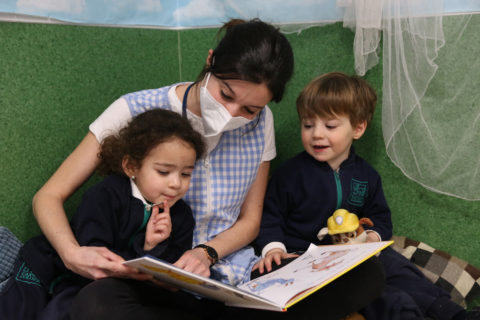
Schools are the ideal place to observe, analyse and evaluate the behaviour of children and adolescents. The British school Caxton College has reinforced its emotional education programmes to meet the challenges of this new era.
Specialists in mental and emotional health have been warning us for some time about the negative effects that the Covid-19 pandemic is having on society, and especially on children and young people.
Conscious of this reality, schools such as Caxton College have been making it a priority to implement educational protocols that aim to provide extra support for those pupils who require it to cope with the complicated situation that we have been facing these past two years. ‘All schools have detected an increase in mental health problems in pupils. The pandemic has brought fear and uncertainty to many families, and perhaps this is why we have seen an increase in anxiety disorders in children and adolescents, but we’ve also seen an increase in the number of children with problems due to factors such as depression or stress’, said Ms Cristina Pérez, psychologist at this British school in Puçol.
New challenges in Early Years education
To deal with this complex situation and provide individual attention to children in Early Years, Caxton College has implemented new educational strategies in the classroom to promote emotional intelligence. Ms Ana Algaba, Head of Baby Caxton (the first stage of infant education), explained the method used to work with children on a daily basis to help them gradually adapt to this new environment with their peers. ‘Many children have started school these past two years having had social relationships only with their parents, but never having interacted with other children or adults before. They’ve also had very little experience in public places. This lack of social education has had repercussions on the children’s behaviour that must be addressed carefully to ensure they subside over time’.
Social and sensory experiences
Through collaborative play, children at Caxton College are stimulated emotionally and acquire social skills that allow them to better interact with their peers and teachers. Children participate in classroom activities that develop their interpersonal skills, such as respect or empathy, and teach them how to look after one another. ‘In short, we offer experiences where they can interact and improve their relationship with their surroundings during these challenging times. During these formative years, they are being forced to contend with a great deal of isolation. In our opinion, it’s essential for them to start to develop their physical and language skills correctly to stimulate their neural networks. Also, it is at this stage of their lives when their personalities begin to be defined, so the sooner any difficulties can be detected at school, the better to ensure it doesn’t become a more serious problem’, said Ms Karen Fraser, Head of Early Years Foundation Stage education at Caxton College.
This kind of activity, whose aim is to improve pupils’ wellbeing and help them to socialise appropriately, is conveyed to parents so that they can also work on these educational objectives at home in collaboration with the school.
Additionally, to remedy behaviour-related problems, it’s useful for children to understand the emotions they feel through specific sensory integration and awareness exercises, yoga, breathing or mindfulness activities. The aim of these techniques is to provide children with the tools they need to identify feelings from the messages they receive from their bodies and be able to create moments of pause or calmness.
Other educational stages
‘In these times, I think we can all agree that it’s essential to prioritise the wellbeing, mental health and emotional intelligence of pupils of all ages’, said Ms Amparo Gil, Principal of Caxton College. In keeping with this philosophy, both Primary and Secondary students at this British school maintain a constant dialogue with their form tutors to monitor their social and emotional wellbeing. ‘If pupils give any cause for concern, both the school psychologists and tutors meet with them to guide them and start to address their problems immediately’, said Ms Pérez. Studies confirm that happy students are more resilient, achieve better academic results and become happy adults who make positive contributions to society. From this perspective, Ms Marta Gil, Vice Principal of Caxton College, said, ‘At our school, we believe in the importance of developing not only the academic side of our pupils, but also providing them with an education in emotional intelligence and values’.
